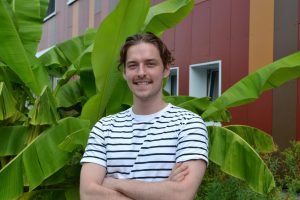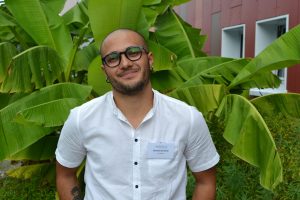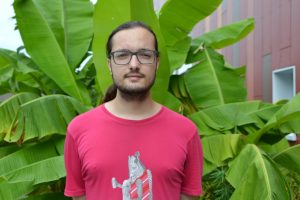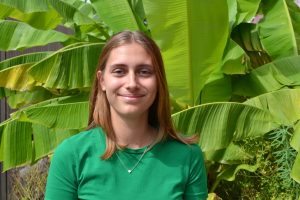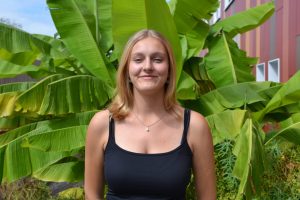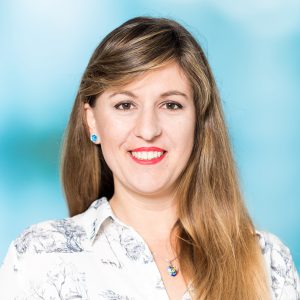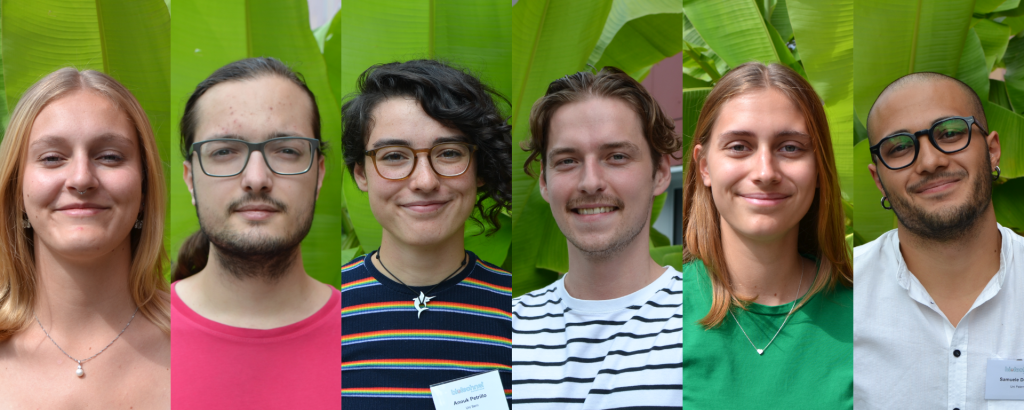
Portraits of the 2024 Summer School in Wädenswil
 Verified listing
Verified listing
- News
- prev
- next
- More information on website
- prev
- next
News article
Thank you to Kasia Kopanska for conducting the interviews with students.
Laurin Schwarz, Double Degree International Biopharma: Masters in Biotechnology & Masters in Pharmaceutical Biotechnologies, MCI and University of Padova
Hearing about how people’s research succeeds, the methods they use, is something I appreciated.
Why did you join the summer school?
I was curious about it! I was interested in the location and the program and thought I would take the opportunity to attend this year. My colleagues went to Palermo last year and had a great time. I’m motivated to see the state of the art in research, industry developments, and talk to people directly about potential career paths.
What is your current research focus?
I finished my Master's thesis on how to inhibit the highly conserved main protease of SARS-CoV-2, responsible for the virus's protein processing. This could lead to new drugs targeting the main protease instead of spike proteins, that are prone to mutations. In the future, this approach will lead to the production of crystalline seleniumorganoid molecules that can be used as an easy-to-handle pill for the treatment of a SARS-CoV-2 infection.
What was your favourite talk or activity so far? I enjoyed all the topics at the summer school, which give a broad perspective on new scientific ideas and possibilities. Hearing about how people’s research succeeds, the methods they use, is something I appreciated from them. It’s okay if your research needs more time, if you keep working toward your goal you will find your way.
What would you like to do in the future?
First, I’m going to take some time to travel and get new ideas. I want to see other countries. Being here in Switzerland, for example, is part of this, and I’m open to moving to other locations, too. I’m interested in enzymes, cell-free production systems, and microfluidics. I’m drawn to the entrepreneurial scene and start-ups. I’m hoping to get some tips here on how to start a biotech firm. I’m looking forward to the pitching activity during the summer school.
Samuele De Santi, Master in Industrial and Biomolecular Biotechnology, University of Palermo
The applications of biotech go far beyond the pharma industry to all aspects of a new green economy.
Why did you choose to study biotechnology?
I followed my dream since I was a child. Big programs in Italy to cure genetic diseases inspired me. I’ve had a variety of jobs, but I know that studying and working in biotechnology is the right path for me. These ‘future technologies’ are changing our world now.
What is your research focus?
My Master thesis will start next year and I don’t know what my topic will be yet. I’ll have to pick in the next few months!!
What was your favourite talk or activity so far?
Not all the talks were equal! The probiotic beverage talk was interesting, learning about the industrial aspects of what we eat and drink. Another talk about preventing incorrect protein folding made an impression on me due to its potential for curing disease. I’m torn between the food and beverage industry, and new therapeutic applications!
What would you like to do in the future?
It will depend on what I do during my Master’s. It won’t limit me but will be a first step in the science world. After, I would like to work in an applied research context. Science is useless if we don’t apply it.
Alexandre Incandela, Bachelor in Biotechnology, HES-SO
Vulgarisation is very important if we want people to support technological innovation.
What attracted you to the field of biotechnology?
I did my CFC in chemistry, and one day we visited HES-SO. They convinced me to join the bachelor’s in biotechnology! Using life (cells) to produce medicine, getting a higher yield and better process control, while being greener, is especially interesting, so I switched from chemistry to biotech.
Why did you join the summer school?
My wife told me it would be a good opportunity to expand my network! I had never been to Zürich and was interested in seeing the city.
What was your favourite talk or activity so far?
I enjoyed the algae talk and the transplant talk. All the presentations are of high calibre and the speakers make it interesting. Even when the topic is challenging, they made it understandable.
What would you like to do in the future?
I would like to work at a start-up like Final Spark in Vevey. They use human brain cultivated cells as processors for computing power. I love the mix of high technology and biotech. In the future, a brain may be able to talk to a silicone chip and enable people to walk again, for example. Later, I would like to teach, and also do high technology research at the interface of silicone and life technologies. I would like to be active in science communication.
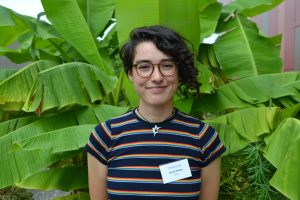
Anouk Petrillo, Bachelor in Chemistry, University Bern
As a chemistry student, getting a perspective on new developments in biotechnology is really enriching.
What attracted you to the field of biotechnology?
As a chemistry student, getting a perspective on new developments in biotechnology is really enriching.
Why did you join the summer school?
I participated last year and enjoyed it a lot, so I requested to join again in 2024!
What was your favourite talk or activity so far?
I come for the talks. The different lectures give me insights about which focus I could pick for my Bachelor, Master or eventually, PhD theses. For example, the talks on biocatalysis and nanotechnology broadened my horizons. For our group project at the summer school, we are proposing to grow fungus on fish sidestream. The fungus produces proteins that can be sold as supplements to the food industry.
What would you like to do in the future?
I like academia, but it takes a lot of sacrifice. After my Master’s degree, I would like to work in industry and get a year of experience before considering if I want to do a PhD. I’ll probably keep a focus on physics, but these talks on catalysts got my interest!
Rosa Schier, BSc in Biotechology, HES-SO
Organoids and organs on a chip really interest me. I would like to work in this field later.
Why did you join the summer school?
First, I wanted to have a few nice days with my friends! And I’m interested in the work of professors and lecturers from other schools. I was looking forward to hearing about cell culture and microbiome for example. I also wanted to make contact to other students from Italy, Austria, and Switzerland.
What was your favourite talk or activity so far?
Adrien Roux from HEPIA. His talk was about organoids and brain on a chip. These types of technologies really interest me and I would like to work in this field later.
What would you like to do in the future?
I hope my Bachelor focus will be on mammalian cells. When I finish, I will probably do a Masters in Applied Cell Biology.
Marine Clivaz, BSc in Biotechology, HES-SO
I appreciated the diversity within my group and the opinions of various students.
Why did you choose to study biotechnology?
I’m interested in immunology and molecular biology. In my studies I've worked on projects where we manipulated DNA and used sequencing technologies. This might influence my future direction.
Why did you join the summer school?
It was a nice opportunity to talk with speakers after presentations. In our project group we were mixed with other schools. I appreciated the diversity within my group and the opinions of various students.
What was your favourite talk or activity so far? The one about the microbiome. All the bacteria that can influence the human body, behaviour, and link to diseases was fascinating. At the summer school we are proposing to replace antibiotics with bacterial phages, to combat antimicrobial resistance.
Published
- 25 September 2024
